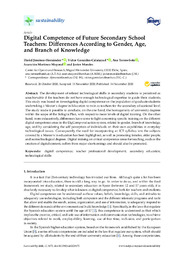Por favor, use este identificador para citar o enlazar este ítem:
https://hdl.handle.net/11000/34232Registro completo de metadatos
| Campo DC | Valor | Lengua/Idioma |
|---|---|---|
| dc.contributor.author | Jiménez Hernández, David | - |
| dc.contributor.author | González Calatayud, Víctor | - |
| dc.contributor.author | Torres-Soto, Ana | - |
| dc.contributor.author | Martínez Mayoral, Mª Asunción | - |
| dc.contributor.author | Morales-Socuéllamos, Javier | - |
| dc.contributor.other | Departamentos de la UMH::Estadística, Matemáticas e Informática | es_ES |
| dc.date.accessioned | 2025-01-09T09:04:48Z | - |
| dc.date.available | 2025-01-09T09:04:48Z | - |
| dc.date.created | 2020-11 | - |
| dc.identifier.citation | Sustainability 2020, 12, 9473 | es_ES |
| dc.identifier.issn | 2071-1050 | - |
| dc.identifier.uri | https://hdl.handle.net/11000/34232 | - |
| dc.description.abstract | The development of related technological skills in secondary students is perceived as unachievable if the teachers do not have enough technological expertise to guide their students. This study was based on investigating digital competence on the population of graduate students undertaking a Master’s degree in Education to train as teachers for the secondary educational level. The study made it possible to conclude, on the one hand, the homogeneity of university degrees within the scope of the Bologna Plan, with respect to mean levels of digital training. On the other hand, more exhaustively, differences have come to light concerning specific training on the different digital competence areas in the DigComp evaluation system, related to gender, branch of knowledge, age, and by considering the self-perception of individuals on their own capabilities in everyday technological issues. Consequently, the need for incorporating an ICT syllabus into the subjects covered by a Master’s in education has been highlighted, as well as promoting females, older people, and nontechnological degrees. Digital training on critical competence areas for teaching, such as the creation of digital content, suffers from major shortcomings and should also be promoted. | es_ES |
| dc.format | application/pdf | es_ES |
| dc.format.extent | 16 | es_ES |
| dc.language.iso | eng | es_ES |
| dc.publisher | MDPI | es_ES |
| dc.rights | info:eu-repo/semantics/openAccess | es_ES |
| dc.rights.uri | http://creativecommons.org/licenses/by-nc-nd/4.0/ | * |
| dc.subject | digital competence | es_ES |
| dc.subject | teacher professional development | es_ES |
| dc.subject | secondary education | es_ES |
| dc.subject | technological skill | es_ES |
| dc.subject.other | CDU::6 - Ciencias aplicadas::60 - Cuestiones generales de las ciencias aplicadas | es_ES |
| dc.title | Digital Competence of Future Secondary School Teachers: Differences According to Gender, Age, and Branch of Knowledge | es_ES |
| dc.type | info:eu-repo/semantics/article | es_ES |
| dc.relation.publisherversion | https://doi.org/10.3390/su12229473 | es_ES |

Ver/Abrir:
sustainability-12-09473 (1).pdf
834,63 kB
Adobe PDF
Compartir:
 La licencia se describe como: Atribución-NonComercial-NoDerivada 4.0 Internacional.
La licencia se describe como: Atribución-NonComercial-NoDerivada 4.0 Internacional.
.png)